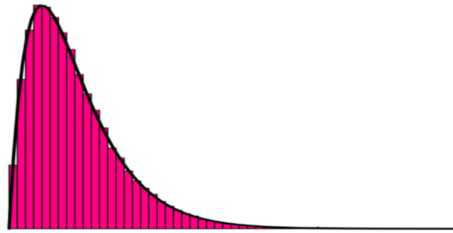Analytics: The complete minicourse
In praise of exploration!
One of my goals for this newsletter is to help turn the jumble of my scattered musings into coherent learning journeys for you, arranged by theme and searchable by keyword. How do you use them? Simply skim the headings and dive into whatever is interesting. (Completionist? Go top to bottom.)
Today’s topic is data analytics, though you might know it as data-mining or descriptive statistics or exploratory data analysis (EDA) or business intelligence (BI) or knowledge discovery (KD), depending on conversational context and which crowd you hung out with during your impressionable years. What’s it all about? Analytics is the quest for inspiration!
Here comes my 2 second lecture on how to do it:
Plot all the things! Look at the information available to you and ask yourself, “Am I (and my stakeholders) inspired?” And if the answer is affirmative, job done. Just remember the one golden rule of analytics: don’t make conclusions beyond your data. (For that, you’d need to put on your statistician hat.) As long as you stick to the facts, you can do no wrong.
Does that sound a bit too easy to be true? Surely there’s a catch? There is! What I’ve described is what it takes to get started with analytics. Reaching the heights of virtuosity is a whole different story.
Analytics is like the writing profession: the basics are easy to get started with and it's an art, so there are few barriers to entry and anyone can be a "writer." There's no guarantee of quality in the title. However, being barely-literate hardly makes you Toni Morrison or Leo Tolstoy - the best writers are light-years away from beginners and they change the world. That's how analytics is too. The variance in the profession is massive. On the other hand, barriers to entry for, say, statistics, are higher, so the minimum level folks are more impressive than minimum level analysts, but there's also a narrower range of virtuosity. I'm often far more impressed by expert analysts than by statisticians and ML engineers.
So, if all you’re after is a nudge to get started with analytics, go look at some numbers already. Don’t wait for special permission. You don’t need any fancy training. Feel free to call yourself an analyst as soon as looking at data starts feeling fun. But if you’re keen to attain expert status, I have bad news for you. While I hope you’ll explore some of the musings linked below, nothing I (or anyone else) could teach you will give you mastery. That takes talent and practice. Lots and lots and lots and LOTS of practice.
Since I’m sending this edition out on Halloween (a day I enjoy more than April Fools’ Day and my birthday combined) let’s begin with a Halloween-flavored piece for your amusement…
[This most excellent of Halloween pumpkins was made by Stephen Worley.]
What is analytics all about?
What happens in a typical analytics 101 class? You usually learn the basics of some analytics software (in R-Python-SQL-SAS-Stata-MATLAB-BigQuery-Tableau-Excel-Looker-whatever), how to load data into that software, and how to make visual summaries like pie charts and histograms. But that’s as much analytics as art is paintbrushes. Art will survive past paint and analytics will outlast spreadsheets. To see the nature of analytics without its typical window-dressing while celebrating today’s festivities, here’s a Halloween-flavored post for your amusement…
Formats:
Blog - bit.ly/quaesita_hallows
Podcast - bit.ly/dipod_hallows
[Me during my grad school days, dressed as a sigma field. Happy Halloween, everyone!]
Beginners: What even is (are?) data?!
If you’re new to data (or you’re someone who pronounces the word as though it has a capital D), it’s probably a good idea to cover this topic before wading into the rest of the swamp…
Included topics: information, data, software, data summaries, plots, histograms, distributions, and a few other tidbits.
Formats:
Blog - bit.ly/quaesita_hist
Podcast - bit.ly/dipod_hist
What makes an analyst excellent?
The excellence of analytics is speed!
Speed of getting data that’s promising and relevant. (Domain knowledge.)
Speed of getting data ready for manipulation. (Software skills.)
Speed of getting data summarized. (Mathematical skills.)
Speed of getting data summaries into their own brains. (Data visualization skills.)
Speed of getting data summaries into stakeholders’ brains. (Communication skills.)
Speed of getting the decision-maker inspired. (Business acumen.)
To learn more, explore this section.
Formats:
Blog - bit.ly/quaesita_speed and bit.ly/quaesita_fastanalyst
Video - bit.ly/quaesita_ytckba
Statistics vocab that every analyst should know
The way we use the terms these days, it turns out that analytics is the discipline that’s about calculating statistics, but statistics is the discipline that’s all about going beyond those statistics. (Speaking of awkward.) But what *is* a statistic? To find out, leap into my intro to statistics vocabulary. While it was written for newbies on the statistics journey, it’s full of terminology that analysts should also know, including sample, population, observation, statistic, parameter, estimate, and hypothesis.
Formats:
Blog - bit.ly/quaesita_vocab and bit.ly/quaesita_gistlist
Podcast - bit.ly/dipod_vocab
Video - bit.ly/quaesita_stc002 through bit.ly/quaesita_stc008
Leaders: Why it’s important to invest in analytics
Analytics gives firms an edge in learning and adapting. When the world is suddenly upended, those who can learn the fastest are best positioned to succeed. Learn more about how analytics fuels innovation during good times and serves as a must-have safety-net when things get rough. Be warned, though: it’s very hard to cobble together a mature analytics department on short notice and leading a group of analysts takes special managerial finesse.
Article in Harvard Business Review - bit.ly/quaesita_hbrrisk
The single most important thing every analyst should know
Psychologists have a pretty name for the brain’s tendency to conjure false meaning out of nothing: apophenia. Give humans a vague stimulus and we’ll find faces, butterflies, and a reason to allocate budget to our favorite project or launch an AI system.
What the mind does with inkblots it also does with data. Like other vague stimuli with multiple interpretations, complex datasets practically beg you to find false meaning in them. To learn more about apophenia, what it means for your career, and what to do about it, explore this section.
Formats:
Blog - bit.ly/quaesita_inkblot
Podcast - bit.ly/dipod_inkblot
In praise of analytics: What to tell the haters
Far from being a sloppy version of other data science breeds, good analysts are a prerequisite for effectiveness in your data endeavors. It’s dangerous to have them quit on you, but that’s exactly what they’ll do if you under-appreciate them. To learn more about why analysts are data science’s most misunderstood heroes and why you’re more likely to need them than any other kind of data professional, read this.
Blog - bit.ly/quaesita_hero
How data charlatans give analytics a bad name
I’m full of (well-deserved) praise for analysts, but I have no love for data charlatans. Unfortunately, many data charlatans hide behind the analyst job title, giving the whole profession a bad name. To learn how to spot a data charlatan and make sure you’re not one of them, read this.
Blog - bit.ly/quaesita_charlatan
How does data analytics fit into data science?
It’s a subset! To learn more about the data science umbrella or to look at a short history of its subdisciplines, explore here.
Formats:
Blog - bit.ly/quaesita_datasci and bit.ly/quaesita_history
Podcast - bit.ly/dipod_history
Video - bit.ly/quaesita_ytaub
Careers: Consider yourself warned!
If you’re an analyst looking for a new gig, don’t forget to check that whoever you’re about to trust with your career understands your needs. During your job interview, ask potential employers these three pointed questions about data, decision-makers, and tools...
Blog - bit.ly/quaesita_22
10 differences between amateurs and professional analysts
There are some big differences between an amateur and an expert professional analyst and in the linked article, I’ll summarize 10 of them for you:
Expert analysts are something special -- it's time we stopped stereotyping analysts by the newbies of the profession and appreciating its badasses for the incredible value they add to your business.
Blog - bit.ly/quaesita_10analyst
Leaders: Are you ready for AI or is analytics what you really need?
Many people who think they want ML/AI actually only need analytics. The latter is a great idea for all projects, while the former is good for only certain kinds. If you’re unsure, go for the sure thing: analytics. Learn more here.
Formats:
Blog - bit.ly/quaesita_first
Podcast - bit.ly/dipod_first
Should analysts study machine learning / AI?
If you're an ambitious analyst, should you muscle up on your machine learning skills? The answer is both yes and no. Yes, you should know how to use machine learning algorithms. But no, the kind of "machine learning" you should study is different from what most machine learning engineers focus on...
Formats:
Blog - bit.ly/quaesita_unsupervised
Video - bit.ly/quaesita_ytanalystsai and bit.ly/quaesita_ytunsupervised
How analytics helps you fight AI bias
Analytics is your best friend in the fight against AI bias.
Blog - bit.ly/quaesita_aibias and bit.ly/quaesita_whatif
How do analysts contribute to machine learning projects?
It depends on the project phase. Take a look at this breakdown of machine learning / AI project tasks to see where analytics skills fit in.
Blog - bit.ly/quaesita_universe
Bonus: Want to make your data science experiments agile?
Adopting an analytics mindset can help! Blog - bit.ly/quaesita_rethinking
What’s the difference between analytics and statistics?
I’m glad you asked! Understanding this will save you a lot of stress if you work with data. Learn more about the professions of analytics and statistics here.
Formats:
Blog - bit.ly/quaesita_versus and bit.ly/quaesita_roles
Video - bit.ly/quaesita_ytversus
Bonus: Can analysts and statisticians get along?
Incompatible species in the terrarium? Blog - bit.ly/quaesita_battle
For those who need a quick way to check whether they need analytics or statistics…
Often, people who think they want statistics are looking for analytics. If you’re not sure whether statistics is for you or what the point of it is, explore this section.
Formats:
Blog - bit.ly/quaesita_pointofstats
Podcast - bit.ly/dipod_pointofstats
Video - bit.ly/quaesita_stc010
Bonus: If it turns out that you need statistics instead of analytics…
My previous newsletter was a collection of my statistics musings. Find them at bit.ly/quaesita_sministats
How about a longer analytics course?
Head over to Coursera for the Google Data Analytics Certificate: bit.ly/googledataanalyst
Is any of this available in other languages?
It sure is, thanks to some amazing volunteers who’ve translated it for you. (If you’d like to help translate to your language, please read this.)
That’s all for now
…Aaaaand that’s EVERYTHING I have published on analytics so far. Now in one place for your amusement. As always, if you enjoyed any of it, the loveliest way you can say thank you is to share it with someone who might enjoy it.
Next time, I’ll take you on a tour of a different data topic entirely…










